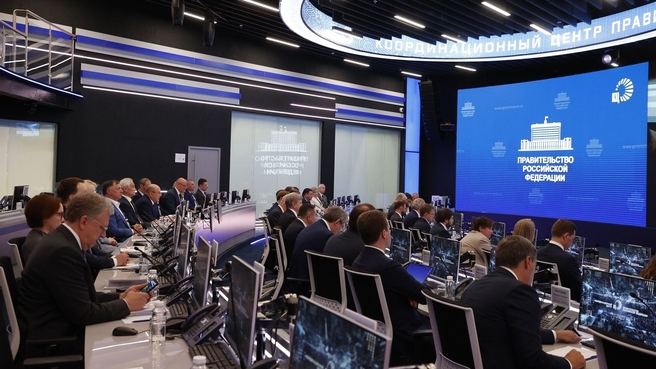Mikhail Mishustin: “We need to envision what changes there will be in the key trends arising from the new circumstances in various markets, what will happen in certain industries, and where to place an additional safety net or accelerate our forward movement. We must make it clear to businesses and people which terms and support measures will remain, which will be modified and how this will be done.”
Mikhail Mishustin’s opening remarks:
Good afternoon, colleagues.
The St Petersburg International Economic Forum opened today. It is a major business event not just for Russia but also for the other developed and developing markets.
Held for the 25th time, the forum brings together the leading businesspeople, politicians and representatives of the expert and academic communities. The President of Russia has attended many of the last editions of the forum.
I know that many people in this audience are planning to address the forum, take an active part in discussions and meet with experts and businesspeople.
Attending the forum has become more than a tradition for many people. It is also an opportunity to present the positions of the Government, ministries and agencies to a large audience, to exchange views on the main strategic issues, and to get feedback and top-level expert opinions on many issues related to the development and economy of our country.
This is especially important now, because this year discussions will be held in fundamentally different political and economic realities.
The Russian and international economies have not faced such challenges for a long time. The anti-Russia activities of the West have also hit at the global markets, which are still dealing with the consequences of the pandemic. This is the reason for the galloping inflation in many countries, the rising petroleum prices, the threat of food shortages, and major imbalances in the demand and supply structure for other essential products.
As per the President’s instruction, the Government promptly adopts decisions for enhancing economic resilience in conditions of unprecedented external pressure. The response centre processes and approves all proposals and includes them in a priority action plan. In the past three months, we have included about 300 highly important measures in this plan.
We are conducting this work in close cooperation with both houses of the national parliament, the Bank of Russia, the Presidential Executive Office, civic organisations and expert groups. We have formalised many ideas in line with the law. Individuals, businesses and various sectors are receiving necessary assistance and support.
This work has mitigated the impact of sanctions. The economy is adapting smoothly to new challenges, we maintain macroeconomic stability, and we implement all planned social programmes. We consistently reduce the administrative burden, and we improve project implementation conditions.
On the whole, we can say that the Russian economy is coping with the pressure of sanctions at this stage.
This is largely facilitated by decisions aimed at achieving the national development goals through 2030, as set by the President, and by our efforts to implement national projects and strategic initiatives.
Some of the short-term measures approved in the past few months allow businesses to act quickly and efficiently, to restructure trade chains, to find new suppliers, and to move deadlines for fulfilling various obligations. In effect, we are now adapting to current challenges and looking for quick answers to the most pressing issues. Of course, it is necessary to back them with mid-term decisions, that are to be implemented over the next three years, and long-term decisions up to 2030.
We have to accomplish new objectives now. For example, we have to chart a long-term planning horizon and mid-term economic adaptation measures. The main goal of our joint work is to ensure economic sovereignty of the Russian Federation. Our country has enough resources for subsequent development, despite all attempts to hamper, stop or even roll us back. We will have to assess changing key trends in connection with new circumstances on various markets, as well as developments in specific industries. We will also have to assess where we should ensure additional safety cushions or speed up development, provide the required funding and other possible state-level assistance.
At our current meeting, we will discuss economic matters, including the main aspects and challenges in the transportation infrastructure and the energy sector. We will outline measures for formulating specific programmes in various sectors.
This work has great significance, despite rapidly changing external conditions and shaky ground for macroeconomic forecasts. We must openly tell businesses and individuals what conditions and support measures will remain, and what aspects will be modified. The main task of today’s session is to form a common vision of future national economic development.












